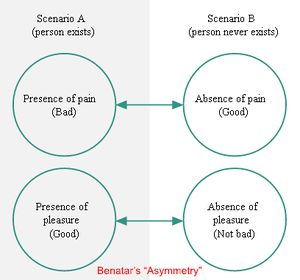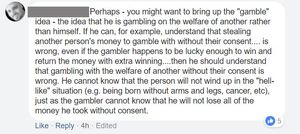Antinatalism
Anti-Natalism is the general or universal belief that there is negative value to procreation.
While there are usually specific cases where sensible people are anti-natalist, like during wars, that in itself is not anti-natalist. Likewise, vegans are usually anti-natalist with respect to farmed animals and believe breeding these animals for a life of suffering and an early death is wrong, again that is in itself not anti-natalism.
Anti-natalists do not have objections merely to specific cases of procreation where inordinate harm is involved, but to procreation generally even from healthy, secure, well adjusted parents; and even to socially and environmentally conscious parents who would pass those values onto their children.
The claim, as many broad claims are, is typically deontological (or dogmatic) in nature and not founded on consequentialistic reasoning that considers exceptions. There are consequentialist anti-natalists, but usually of a special negative variety (based on blind adherence to claims like Benatar's Asymmetry).
Contents
Philosophical Arguments
Benatar's Asymmetry
One of the Bad Arguments for Veganism Benatar's asymmetry claims on intuition that the absence of pain is good, but the absence of pleasure is not bad.This is related to negative utilitarianism, although he doesn't deny the positive value of pleasure during existence as negative utilitarians do.
Existence Bias
An unfalsifiable but seemingly empirical claim that we are biased about our own existence, so we're perpetually in error when we assess that we enjoy life/that we are generall happy about having been born, and instead are in fact subject to far more bad than good in life.
It's a serious problem to make controversial and forceful prescriptions for others based on unsubstantiated (and particularly unfalsifiable) claims about empirical reality. To demonstrate why this is, the very opposite can be just as easily asserted, or even apparently absurd (but still unfalsifiable) claims about factory farmed animals experiencing more pleasure than pain despite appearances: a carnist may just as well claim that the farmed animals are just stressed because they have "pessimism biases" but in fact are experiencing far more goods than bads and so the industry is moral. Assertions like this are not productive to discourse. However, the principle of why this kind of unfalsifiable claim is categorically problematic is difficult to explain to anti-natalists.
Fortunately the force of this claim, if true, also depends on on a hedonistic value system (as opposed to a preference system) where pleasures and pains can be objectively weighed against each other to come to a conclusion as to whether your life has net negative or positive value to you regardless of how you actually feel about it or what your interests are -- and this is a claim that can be attacked very persuasively for most people using simple thought experiments that challenge intuitions on this point (The "pleasure pill" challenge that puts a person in a mindless euphoric coma to maximize hedonic pleasure), as well as challenged philosophically on its arbitrarity (why is this particular electrochemical signal bad? Why is another good? What about species with different neural architecture?), and empirically based on its connections to psychological egoism. Challenges to hedonism can be found in more detail in Hedonism vs Preference.
Within a preference framework, such claims of Existence Bias don't make any sense unless you're talking to somebody who claims to only prefer maximizing pleasure and minimizing pain (in which case you can talk about idealized interests), but this in itself is a very rare case and doesn't support this argument for antinatalism since its overwhelmed by people satisfying sincere non-hedonistic preferences.
Consent to Exist
The deontological claim that acting on another without consent is always wrong, and that because a non-existent being can not consent to come into existence creating a sentient being is always wrong.
In response to the claim that most people end up being reasonably happy about existing, commonly an analogy to stealing somebody's money and gambling with it (giving them the proceeds) is made, however this analogy fails in many important ways.
Most crucially, gambling is Zero Sum, often even negative sum (because the house always wins) and life is not. If you stole money from people to gamble, on average you would never be able to give them back more than you stole; this is statistically a harm, thus it's wrong to do because you will cause more harm than benefit. If you had a magic slot machine that paid out so substantially more than you put in, losses were incredibly rare, and the overwhelming majority of people you stole from to play the game for them were thankful for it, that would be very different.
There's also a huge difference with respect to the potential to obtain consent: When somebody is unconscious or unable to consent to medical care (or other immediate issues) we typically rely on professionals and family to consent for them. The people you are stealing from to gamble for presumably would be capable of consenting or declining your proposition if you asked them. It's typically inappropriate to do things without people's consent when they're capable of giving it, but not when they aren't, so this analogy of stealing from people to gamble for them is a poor analogy to the pre-birth state; you would have had the option to simply ask them and find out for sure if they were OK with it or not.
If it were the case that you had a magic slot machine that paid out BIG 99% of the time, but you only had access to it today, had no money, and your friend was in a convenient coma for the day with his coin purse beside him, YES you should take a quarter and play the slots for him, because he probably would have wanted you to do it.

